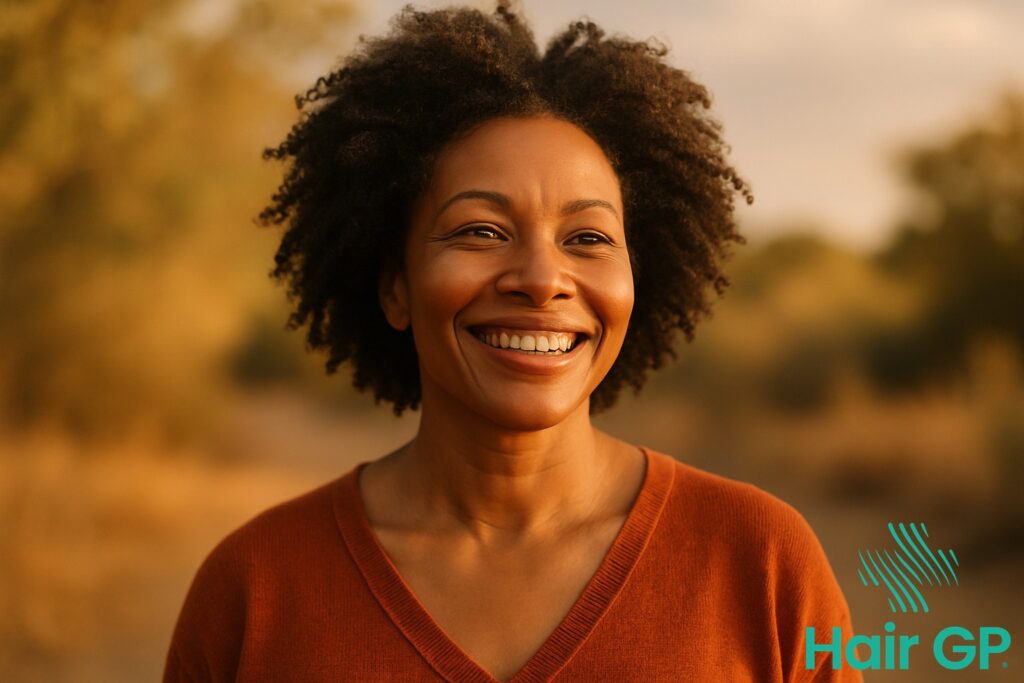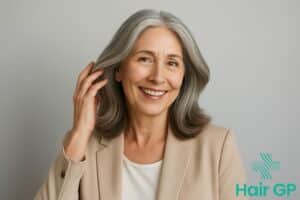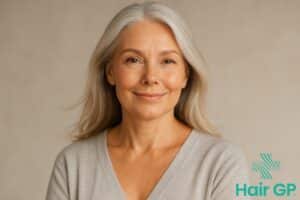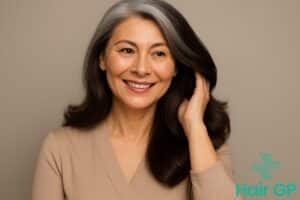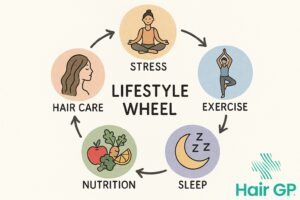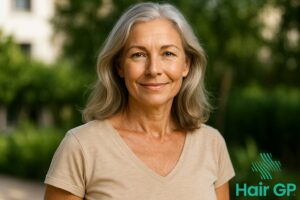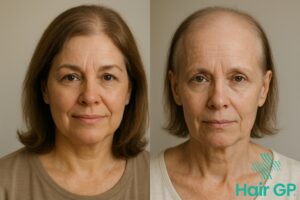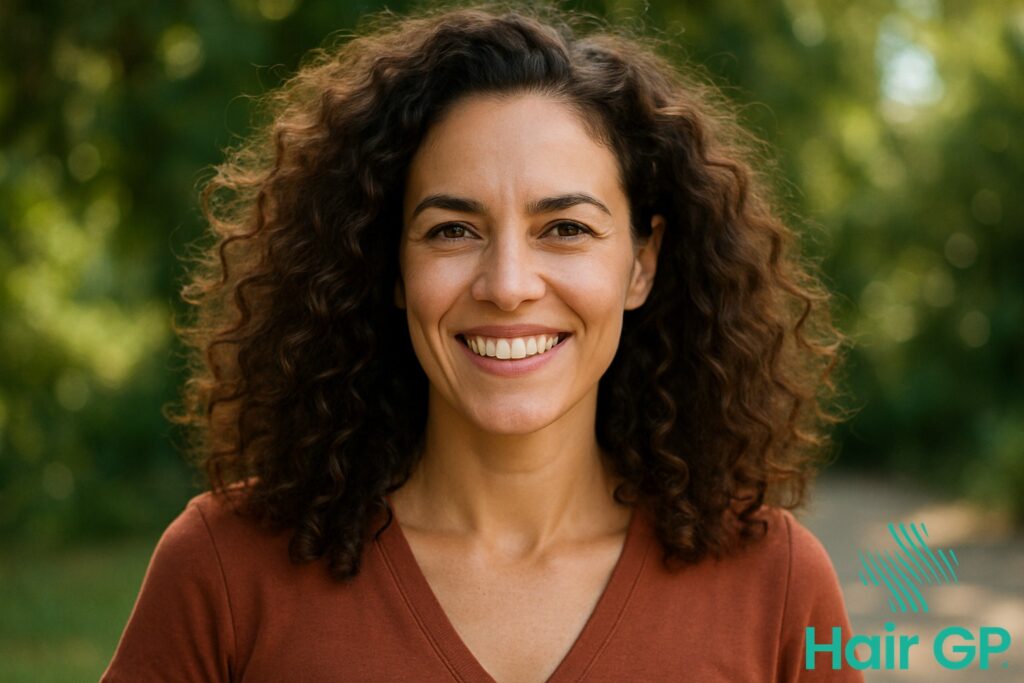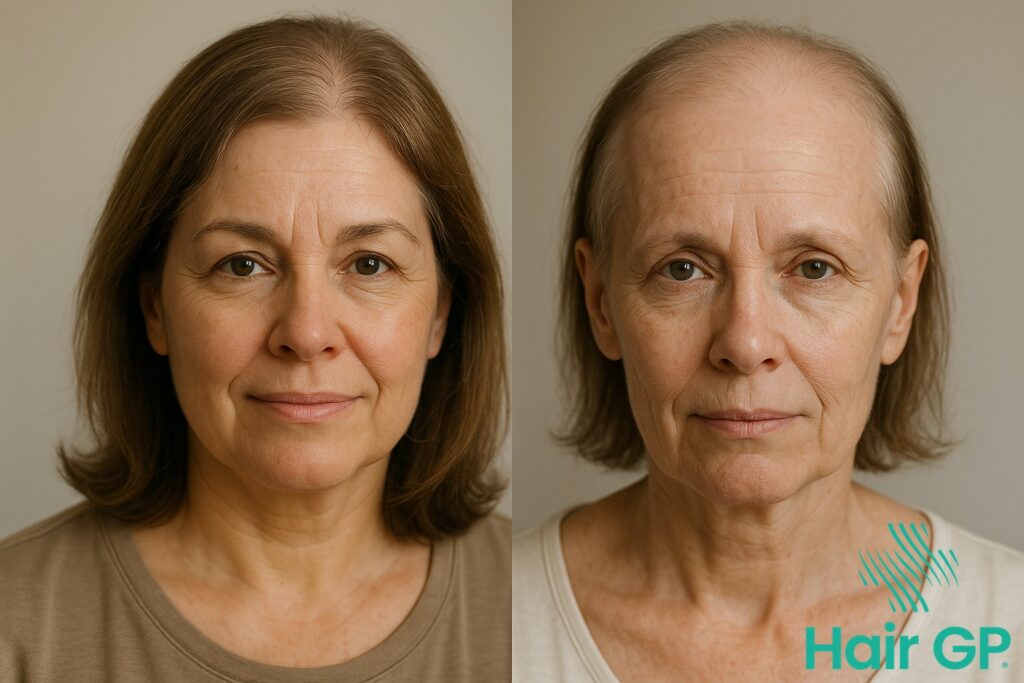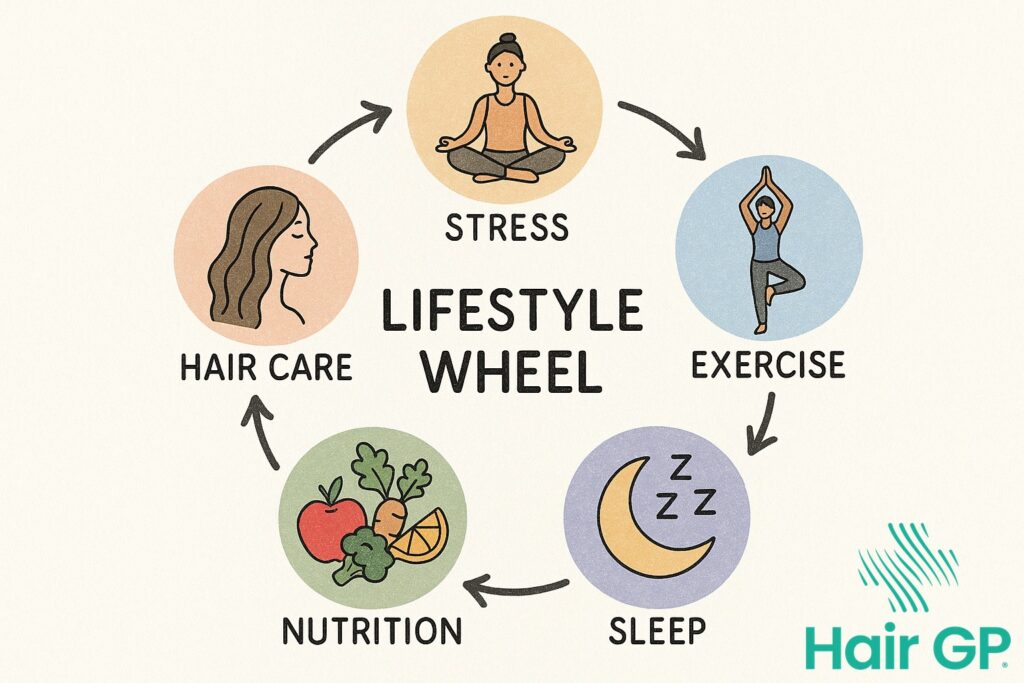Introduction
For many women experiencing menopause, hair thinning can feel like losing a fundamental part of their identity. If you’ve noticed more strands in your hairbrush or visible changes in your hair’s volume and texture, you’re not alone. Menopausal hair loss affects up to two-thirds of women during the menopause transition, yet it remains one of the least discussed symptoms of this natural life stage.
The impact of female hair loss extends far beyond physical appearance. It can shake your self confidence, alter how you see yourself in the mirror, and affect your relationships and daily interactions. These feelings are entirely valid—your hair has likely been part of your personal expression for decades, and watching it change can trigger a complex mix of emotions.
This comprehensive guide will walk you through understanding why these changes occur, from the hormonal shifts affecting your hair follicles to the various patterns of thinning you might experience. You’ll discover evidence-based treatment options that can help restore hair growth, along with styling techniques to maximise your hair’s appearance right now. We’ll explore strategies for managing the emotional aspects, building supportive connections with others who understand, and developing self-care practices that nurture both body and mind.
Most importantly, you’ll learn how to redefine beauty on your own terms and rebuild genuine confidence from within. Hair loss during menopause may be common, but it doesn’t have to define your journey. With the right knowledge, support, and strategies, you can emerge feeling empowered and beautiful in this new chapter of life.
Key Takeaways – TL/DR
- Up to 40% of women experience significant hair loss during menopause due to hormonal changes
- Hair loss impacts self-esteem but multiple evidence-based treatments can help restore both hair and confidence
- Building a support system and reframing beauty standards are crucial for emotional recovery
- Combining medical treatments with styling strategies and self-care creates the most effective approach
The Emotional Toll of Menopausal Hair Loss
Hair loss during menopause isn’t just about physical changes—it’s a deeply emotional journey that affects self-perception, relationships, and daily interactions. Understanding the psychological impact of significant hair loss helps menopausal women recognise that their feelings are valid and shared by many others navigating this challenging transition.
Identity and Self-Image Changes
For countless women, hair represents far more than just strands on their head—it’s an integral part of their identity. When female pattern hair loss begins, it can trigger profound grief over a changing appearance that feels beyond their control. Studies show that up to 55% of women experiencing hair loss report decreased quality of life and psychological distress[1].
The mirror becomes an enemy as menopausal women notice thinning patches, widening parts, or overall volume loss. This shift in self-image often leads to low self esteem that permeates every aspect of life. Many women describe feeling “invisible” or “less feminine,” wrestling with societal expectations that equate thick hair with youth and vitality.
Social withdrawal becomes a common coping mechanism. Women may decline invitations, avoid photographs, or spend excessive time styling hair to conceal thinning areas. This isolation compounds the emotional burden, creating a cycle where decreased social interaction further damages self esteem and confidence.
Impact on Relationships and Social Life
Significant hair loss doesn’t just affect how women see themselves—it influences how they believe others perceive them. Intimate relationships may suffer as women feel less attractive or worry their partners notice the changes. Research indicates that 40% of women with hair loss experience relationship difficulties[2].
In social settings, the anxiety can be overwhelming. Women report constant worry about lighting, wind, or activities that might reveal thinning areas. This hypervigilance exhausts emotional resources and diminishes enjoyment of previously loved activities.
Workplace confidence often plummets as well. Professional women may feel their credibility is undermined by changing appearance, particularly in youth-oriented industries. Some report avoiding leadership opportunities or presentations, fearing judgment about their appearance rather than focusing on their capabilities.
Understanding these emotional challenges is crucial for healing. Acknowledging that these feelings are normal—not vain or superficial—represents the first step towards addressing both the physical and psychological aspects of menopausal hair loss.
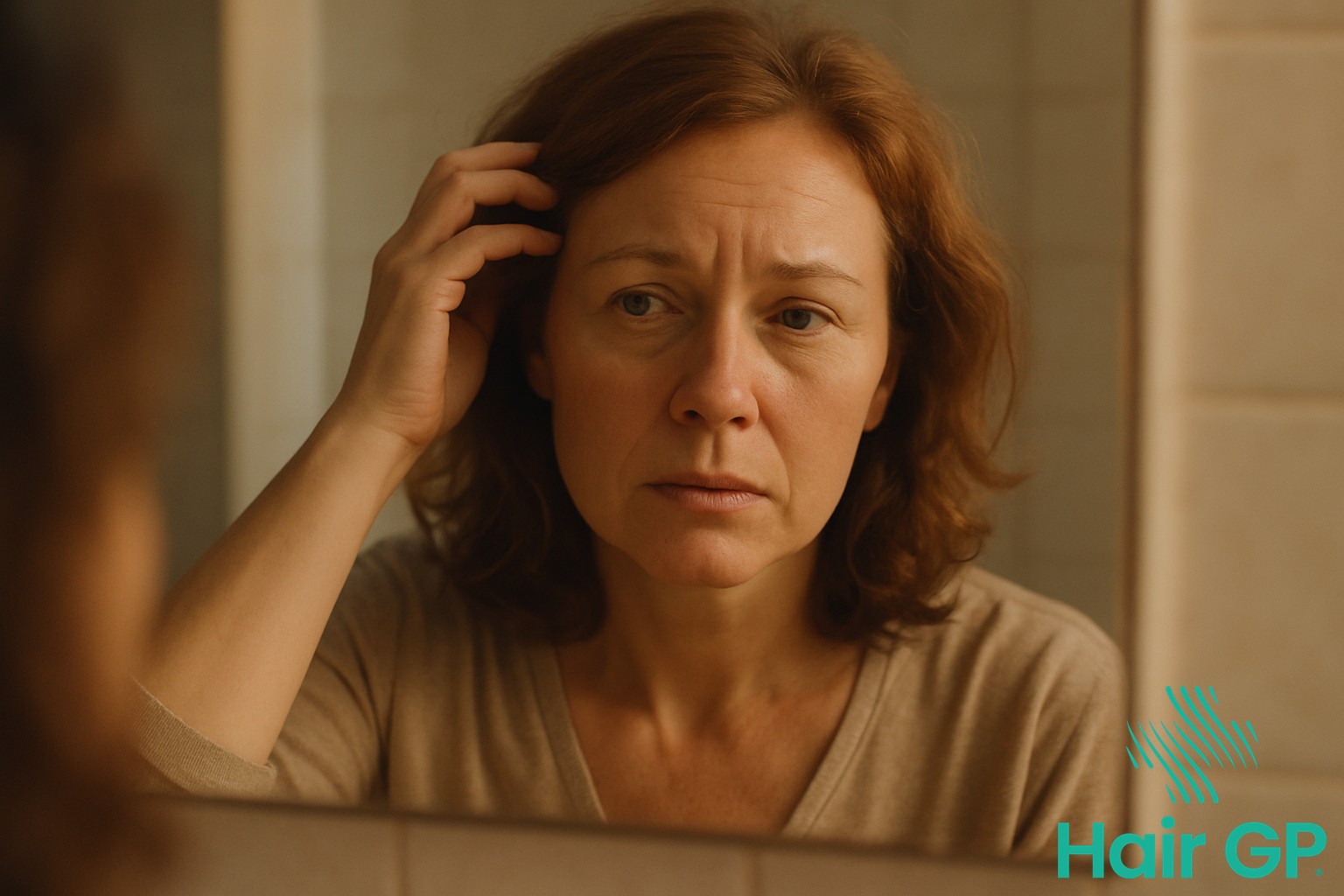
Understanding the Science: Why Hair Changes During Menopause
Understanding the biological processes behind menopausal hair loss helps reduce fear and uncertainty surrounding this common experience. The complex interplay of hormonal changes disrupts the hair growth cycle in multiple ways, leading to various types of hair loss that can occur during perimenopause and beyond.
Hormonal Shifts and Hair Follicles
Oestrogen plays a crucial protective role in maintaining healthy hair throughout a woman’s reproductive years. This hormone promotes the anagen (growth) phase of the hair growth cycle and helps maintain hair thickness and density [3]. During perimenopause and menopause, declining oestrogen levels remove this protective effect, whilst relative androgen dominance becomes more pronounced.
As oestrogen decreases, hair follicles become more sensitive to androgens, particularly dihydrotestosterone (DHT). This testosterone derivative binds to receptors in hair follicles, causing follicle miniaturisation—a process where follicles gradually shrink and produce progressively finer, shorter hairs . This hormonal shift affects postmenopausal women differently, with some experiencing more dramatic changes than others due to genetic susceptibility and individual hormone levels.
Types of Hair Loss in Menopause
The most common form of hair loss during menopause is androgenetic alopecia, also known as female pattern baldness. This condition typically presents as diffuse thinning across the crown and top of the scalp, with preservation of the frontal hairline. Unlike male pattern baldness, women rarely experience complete baldness, but rather notice widening of their centre parting and reduced hair volume.
Telogen effluvium represents another significant pattern of menopausal hair loss. This temporary condition occurs when hormonal fluctuations push large numbers of hair follicles into the resting (telogen) phase simultaneously. Women experiencing telogen effluvium may notice sudden, diffuse shedding across the entire scalp, typically 2-3 months after a triggering event. Whilst distressing, this type of hair loss is usually reversible once hormonal balance stabilises.
Other Contributing Factors
Beyond hormonal changes, several additional factors can exacerbate hair loss during menopause. Thyroid dysfunction, particularly hypothyroidism, frequently develops during midlife and can significantly impact hair health. Iron deficiency, vitamin D insufficiency, and inadequate protein intake also contribute to hair thinning in menopausal women.
Certain medications commonly prescribed during menopause, including some antidepressants and blood pressure medications, may list hair loss as a side effect. Chronic stress, which often increases during the menopausal transition, elevates cortisol levels that can further disrupt the hair growth cycle. Understanding these interconnected factors empowers women to take a comprehensive approach to addressing hair health during this life stage.
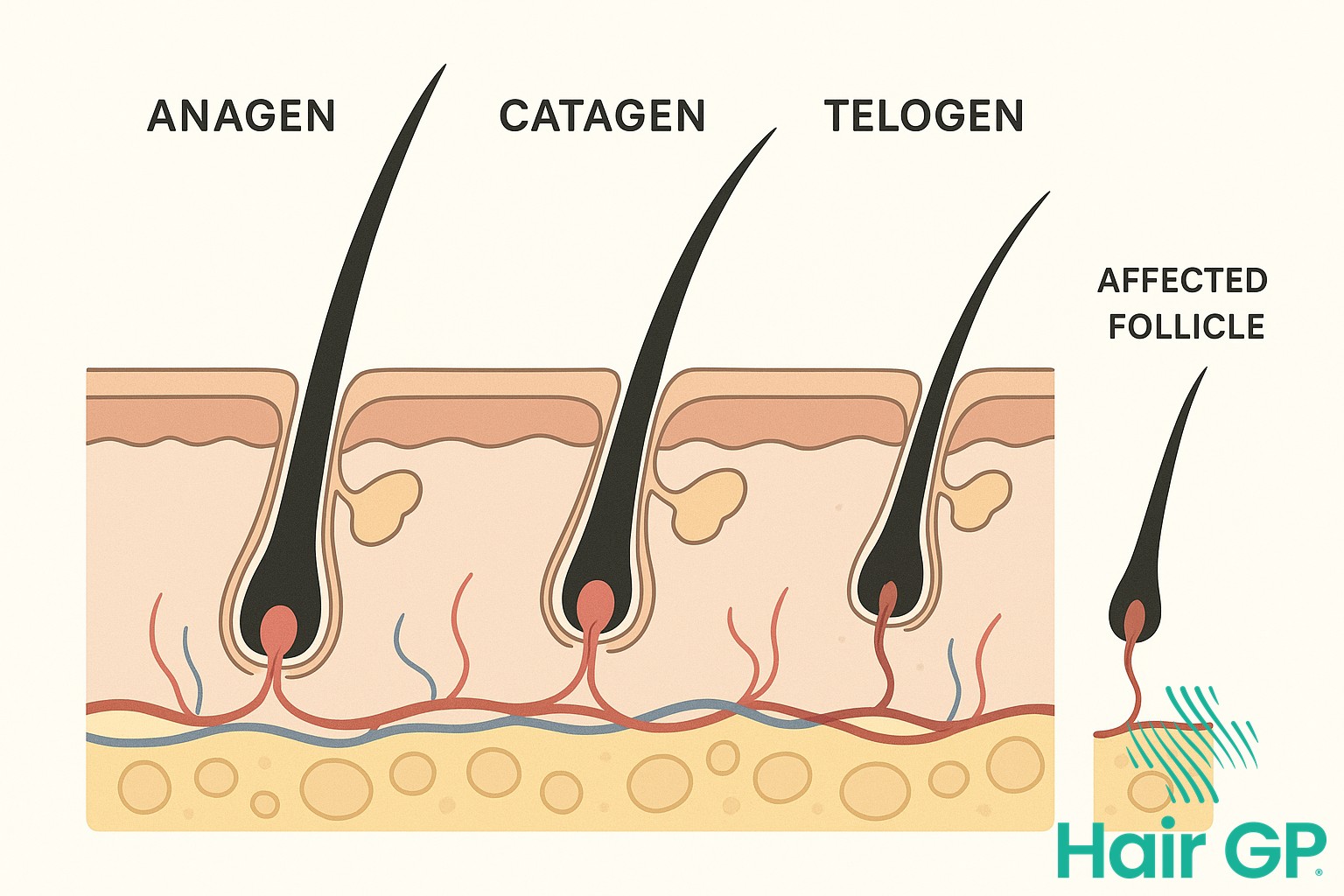
Breaking Free from Shame and Stigma
Breaking free from shame surrounding hair loss requires actively challenging the beauty standards that equate a woman’s worth with her appearance. By recognising how societal pressures shape our self-perception, particularly for middle aged women experiencing menopausal symptoms, we can begin developing healthier relationships with our changing bodies and reclaim the ability to feel confident regardless of hair density.
Challenging Beauty Standards
Media representation perpetuates unrealistic expectations by predominantly featuring women with impossibly thick, lustrous hair well into midlife. These images rarely reflect the reality that hair changes are natural menopausal symptoms affecting most women. Television adverts and magazines digitally enhance hair volume, creating impossible standards that leave real women feeling inadequate.
Cultural perspectives on hair loss vary dramatically worldwide. Whilst Western societies often stigmatise thinning hair in women, other cultures view grey hair and natural ageing as symbols of wisdom and respect. Understanding these different viewpoints helps challenge the notion that hair loss diminishes a woman’s value or attractiveness.
Generational differences also influence how women perceive hair changes. Younger generations increasingly embrace body positivity and natural beauty, whilst older women may struggle with deeply ingrained beliefs about maintaining youthful appearances. Bridging these perspectives through intergenerational dialogue and menopause support groups can help normalise hair changes as part of life’s natural progression.
Developing Self-Compassion
Mindfulness practices offer powerful tools for managing distressing thoughts about hair loss. Simple breathing exercises and body scans help women stay present rather than catastrophising about future changes. Regular meditation cultivates awareness of negative thought patterns without judgement, creating space for more balanced perspectives.
Transforming positive self-talk requires conscious effort but yields significant benefits. Instead of criticising thinning areas, practise acknowledging your body’s resilience through midlife transitions. Replace “I look terrible” with “My body is navigating significant changes.” This shift doesn’t deny reality but reframes it compassionately.
Acceptance strategies focus on embracing what is whilst taking empowering action where possible. This might mean experimenting with new hairstyles that work with current hair texture, joining menopause support communities, or simply allowing yourself to feel confident regardless of hair thickness. True acceptance combines self-compassion with practical adjustments that honour your evolving needs.
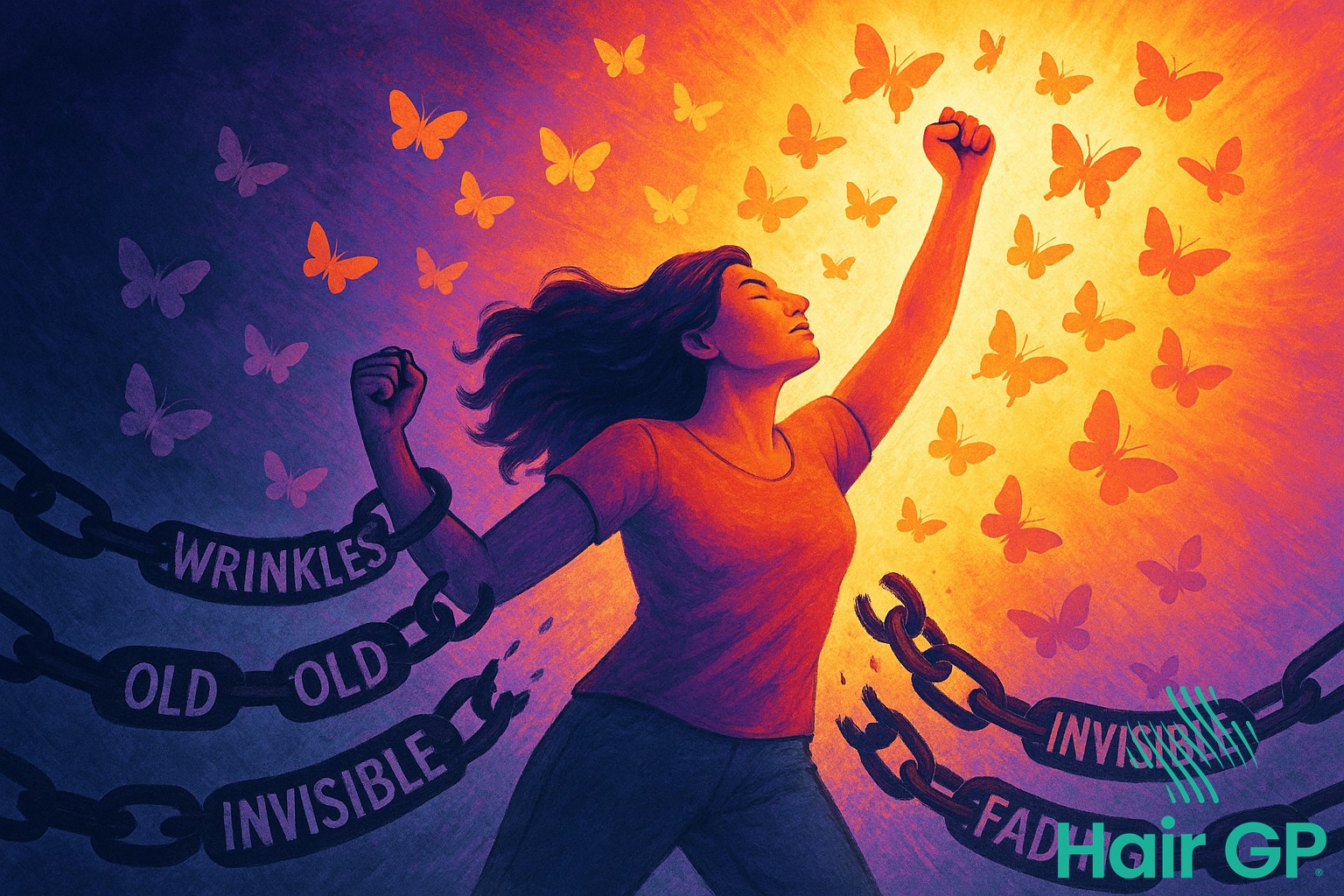
Evidence-Based Treatment Options
Evidence-based hair loss treatments for menopausal women encompass a range of medical, natural, and emerging therapies designed to address the hormonal imbalances underlying androgenic alopecia. Understanding the effectiveness and considerations of each approach empowers women to make informed decisions about their hair restoration journey, whether through FDA-approved medications, nutritional interventions, or innovative procedures that promote hair growth.
Medical Interventions
FDA-approved medications remain the cornerstone of evidence-based hair loss treatments. Minoxidil, available as a 2% or 5% topical solution, demonstrates significant efficacy in postmenopausal women. Clinical studies show that 5% minoxidil produces superior results, with approximately 44% of women experiencing moderate hair regrowth after 32 weeks of treatment [4]. The medication works by prolonging the anagen phase and increasing follicular diameter, though results require consistent application and may take 3-4 months to become visible.
Hormone replacement therapy (HRT) can effectively prevent hair loss in women experiencing severe menopausal symptoms. Oestrogen supplementation helps counteract the relative increase in androgens, potentially slowing the progression of androgenic alopecia. However, the decision to use HRT requires careful consideration of individual risk factors, including family history of breast cancer and cardiovascular disease.
Prescription medications like spironolactone, an anti-androgen originally developed for hypertension, show promise in reducing hair loss by blocking androgen receptors in hair follicles. Studies indicate that doses of 100-200mg daily can improve hair density in women with androgenetic alopecia [5]. Other options include finasteride, though its use in women requires strict contraceptive measures due to potential foetal abnormalities.
Natural and Nutritional Approaches
Nutritional supplementation plays a crucial role in supporting hair health during menopause. Biotin supplementation at 5mg daily has shown improvements in hair thickness and reduced shedding, particularly when combined with other B vitamins. Iron deficiency, common in perimenopausal women, directly impacts hair growth; correcting ferritin levels below 70 μg/L can significantly improve hair density.
An anti-inflammatory diet rich in omega-3 fatty acids, antioxidants, and phytoestrogens may help promote hair growth naturally. Foods like salmon, walnuts, and flaxseeds provide essential nutrients whilst soy products offer mild oestrogenic effects. Regular scalp massage, performed for 5-10 minutes daily, enhances blood circulation to follicles and may improve hair thickness when combined with essential oils like rosemary or peppermint.
Emerging Therapies
Platelet-rich plasma (PRP) therapy represents a promising advancement in hair restoration. This autologous treatment involves injecting concentrated growth factors from the patient’s blood into the scalp. Recent trials demonstrate that PRP can increase hair density by 30-40% after three monthly sessions [6].
Low-level laser therapy (LLLT) devices, now available for home use, stimulate cellular activity in hair follicles through photobiomodulation. Clinical evidence suggests that consistent use of FDA-cleared devices can increase hair count by 20-25% over 16-26 weeks. Whilst hair transplants remain an option for severe cases, newer techniques like follicular unit extraction offer more natural results with minimal scarring. Stem cell research continues to advance, with preliminary studies showing potential for regenerating dormant follicles, though these treatments remain largely experimental.
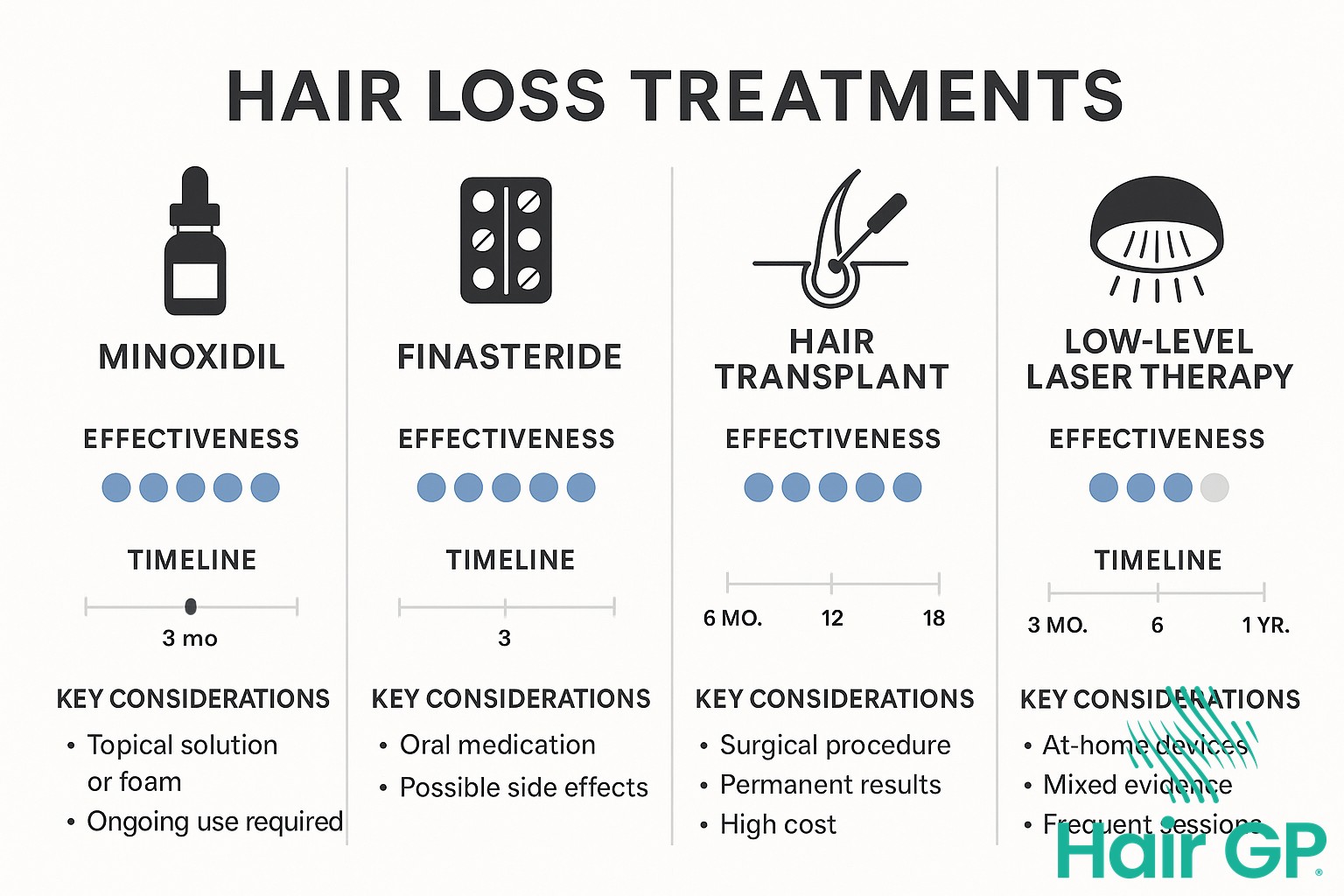
Rebuilding Confidence Through Self-Care
Rebuilding confidence during the menopausal transition requires a holistic approach that nurtures both body and mind through thoughtful self-care practices. By implementing targeted strategies for physical activity, stress management, and nutrition, women can effectively support their overall wellness whilst addressing specific concerns about healthy hair growth and other menopausal symptoms.
Exercise and Movement
Regular physical activity offers profound benefits beyond basic fitness, particularly for women navigating menopause care. Cardiovascular exercise improves blood circulation to hair follicles, delivering essential nutrients that support hair health and encourage stronger growth. Activities like brisk walking, swimming, or yoga for just 30 minutes daily can significantly reduce stress hormones that may contribute to hair thinning.
The endorphin release from exercise acts as a natural confidence booster, helping to counteract mood changes and cognitive symptoms often experienced during menopause. Movement also helps regulate body temperature, potentially reducing the frequency and intensity of hot flashes whilst promoting better sleep quality.
Stress Management Techniques
Chronic stress elevates cortisol levels, which can directly impact hair growth cycles and exacerbate menopausal symptoms. Implementing daily meditation practices, even for just 10-15 minutes, helps regulate stress hormones and creates mental clarity during this transitional period. Simple breathing exercises, such as the 4-7-8 technique, can be practised anywhere when feeling overwhelmed.
Establishing proper sleep hygiene becomes crucial for managing both stress and physical symptoms. Creating a cool, dark sleeping environment, maintaining consistent bedtimes, and avoiding screens before bed can improve sleep quality, which directly supports healthy hair growth and overall wellbeing during the menopausal transition.
Nutrition for Hair Health
Adequate protein intake forms the foundation for hair strength, with experts recommending approximately 0.8-1 gram per kilogram of body weight daily. Lean meats, fish, eggs, and plant-based proteins provide the building blocks necessary for hair structure and growth.
Iron deficiency commonly affects menopausal women and can contribute to hair loss. Combining iron-rich foods like spinach, lentils, and lean red meat with vitamin C sources enhances absorption. B-vitamins, particularly biotin and B12, along with vitamin D, play crucial roles in maintaining hair health throughout menopause care.
Hydration remains fundamental yet often overlooked. Drinking 8-10 glasses of water daily supports nutrient delivery to hair follicles and helps manage various menopausal symptoms, including cognitive changes and temperature regulation.
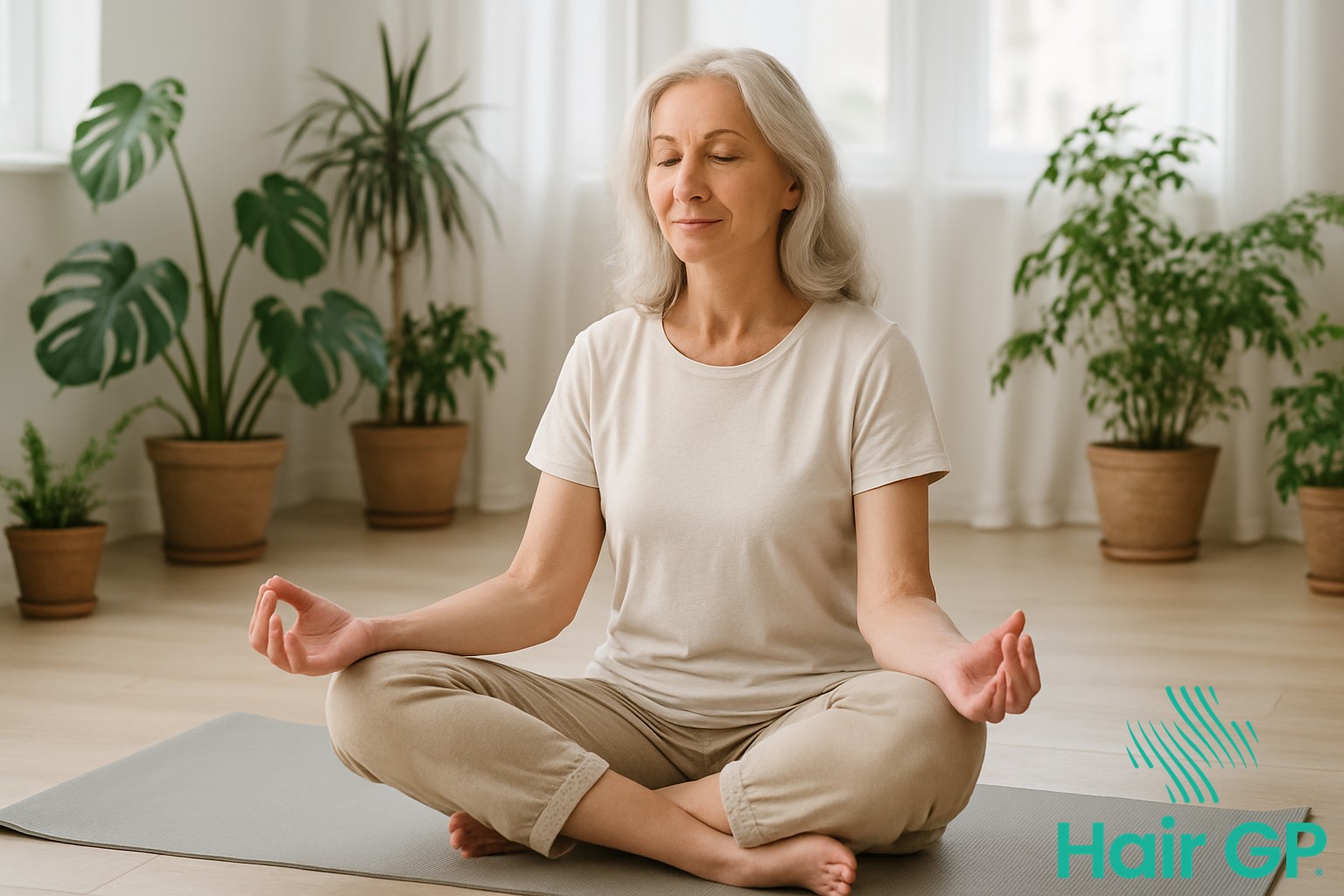
Styling Strategies for Thinning Hair
Managing thinning hair requires thoughtful styling approaches that maximise volume whilst protecting delicate strands. With the right techniques and products, women experiencing hair falling can create the appearance of fuller, more vibrant hair whilst maintaining optimal hair health.
Volumising Techniques
Professional stylists recommend specific blow-drying methods to create instant volume in thinning hair. Begin by applying a lightweight mousse to damp roots, then blow-dry with your head inverted, lifting sections at the crown with a round brush. This technique counteracts the flattening effect common in female pattern hair loss by creating lift at the scalp. For optimal results, finish with a cool blast to set the style and add shine.
Root lifting becomes essential when dealing with thinning hair, as it creates the illusion of density. Use velcro rollers on the crown area whilst hair is still warm from styling, leaving them in place for 10-15 minutes. Strategic layering also plays a crucial role; shorter layers around the face and crown area can disguise thinning whilst adding movement and body. However, avoid excessive layering which can make hair appear even thinner.
Product Selection
Choosing appropriate products is fundamental for maintaining healthy hair when experiencing thinning. Lightweight formulas are essential as heavy products can weigh down delicate strands and emphasise areas affected by hair loss. Look for volumising mousses and sprays containing polymers that coat individual strands, creating the appearance of thicker hair without residue build-up.
Volumising ingredients such as hydrolysed wheat protein and panthenol strengthen hair whilst adding body. These ingredients are particularly beneficial for those experiencing female pattern hair loss or similar conditions to male pattern baldness. Scalp-friendly options should be prioritised, selecting products free from heavy silicones that can clog follicles. Instead, choose formulations with nourishing ingredients like caffeine, and essential oils that support scalp health whilst providing styling benefits. Regular clarifying treatments ensure product build-up doesn’t compromise hair health or styling results.
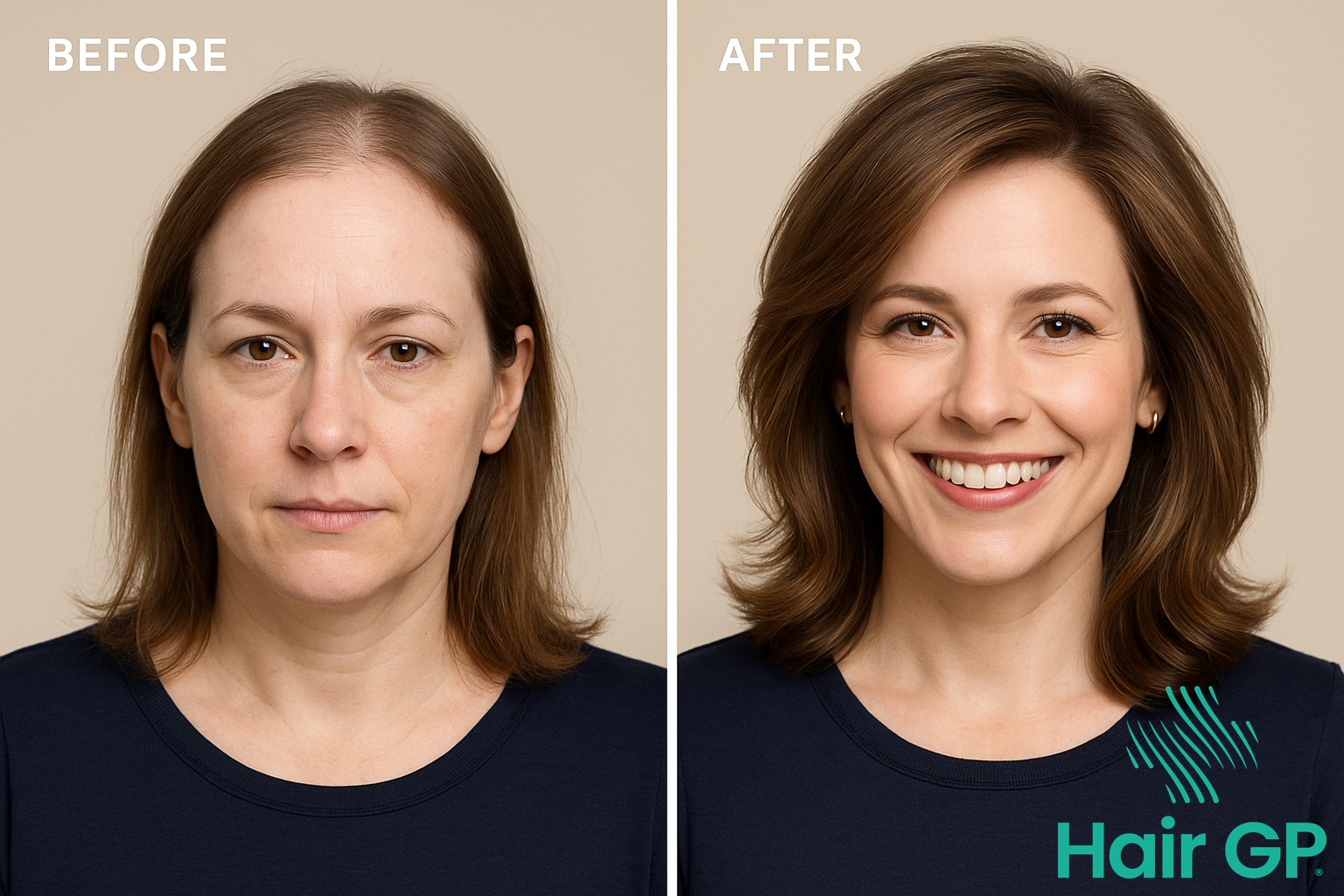
Building Your Support Network
Creating meaningful connections during hair loss can transform a challenging journey into one of shared understanding and empowerment. By fostering open communication and seeking appropriate menopause support, women can build a robust network that provides emotional strength and practical guidance throughout their experience.
Communicating with Family and Friends
Honest conversations about hair loss form the foundation of meaningful support. When menopausal women share their experiences openly, they often discover that others understand or have faced similar challenges. Begin by choosing a comfortable setting and explaining how common menopause symptoms like hair thinning affect your daily life and self-image.
Setting clear boundaries helps maintain healthy relationships whilst managing this transition. Let loved ones know what type of support feels most helpful—whether that’s accompanying you to appointments, helping research treatments, or simply listening without offering solutions. Education plays a crucial role; share information about how perimenopausal changes affect hair health, helping family members understand this isn’t simply about vanity but about navigating significant physical changes.
Consider providing specific ways people can help, such as joining you for stress-reducing activities or respecting your choice to wear head coverings when needed. Remember that those who experience menopause symptoms differently may still offer valuable emotional support when approached with clear communication.
Finding Professional Support
Professional guidance becomes invaluable when menopause related symptoms significantly impact emotional wellbeing. Selecting a therapist experienced in women’s health issues ensures understanding of the complex relationship between hormonal changes and psychological health. Look for practitioners who specialise in life transitions or have specific training in supporting women through menopause.
Medical specialists, including endocrinologists and GP’s familiar with hormonal hair loss, provide essential expertise in treatment options. These professionals can coordinate care, ensuring that hair loss management aligns with overall health strategies for managing perimenopausal symptoms.
Support groups offer unique benefits by connecting you with others experiencing similar challenges. Whether online or in-person, these communities provide practical tips, emotional validation, and the powerful reminder that you’re not alone in navigating hair changes during this life stage.
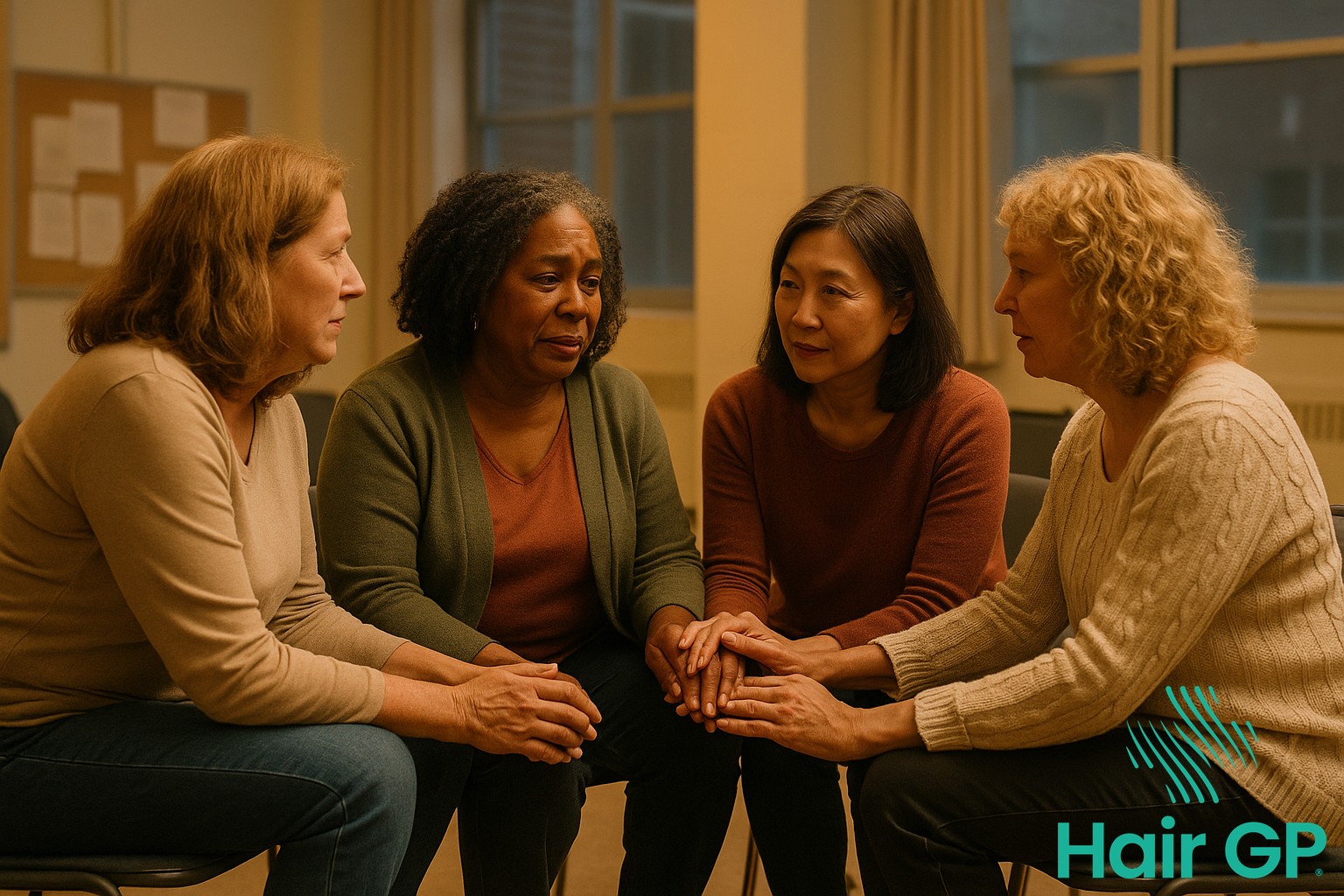
Redefining Beauty and Embracing Your Journey
The journey through menopause invites a profound reimagining of beauty that extends far beyond conventional standards. As postmenopausal women navigate physical changes, including those who experience hair loss, there emerges an opportunity to craft a deeply personal definition of beauty—one that honours both transformation and authenticity. This midlife transition becomes not merely about managing symptoms, but about discovering a more expansive understanding of self-worth that transcends appearance alone.
True beauty in post menopause often reveals itself through the confidence gained from weathering life’s storms and emerging stronger. Whether facing conditions like alopecia areata or the natural thinning that accompanies hormonal shifts, women are discovering that their worth isn’t diminished by these changes. Instead, they’re finding power in vulnerability, strength in adaptation, and grace in acceptance. This transformation allows for a beauty that radiates from within—one built on resilience, wisdom, and self-compassion.
The midlife years offer unique gifts: the freedom to prioritise authenticity over approval, the courage to embrace change rather than resist it, and the wisdom to recognise that beauty evolves rather than fades. Many confident women report feeling more comfortable in their skin post-menopause than at any other life stage, having shed the weight of others’ expectations. They understand that every silver strand, every line earned through laughter or contemplation, tells a story worth celebrating.
This journey of redefinition extends beyond individual transformation to collective empowerment. As more postmenopausal women share their stories openly, they’re creating new narratives around ageing and beauty. By embracing their evolving selves with grace and confidence, they’re pioneering a movement that celebrates the richness of midlife experience, proving that true beauty flourishes when we honour our authentic journey rather than conforming to narrow ideals.
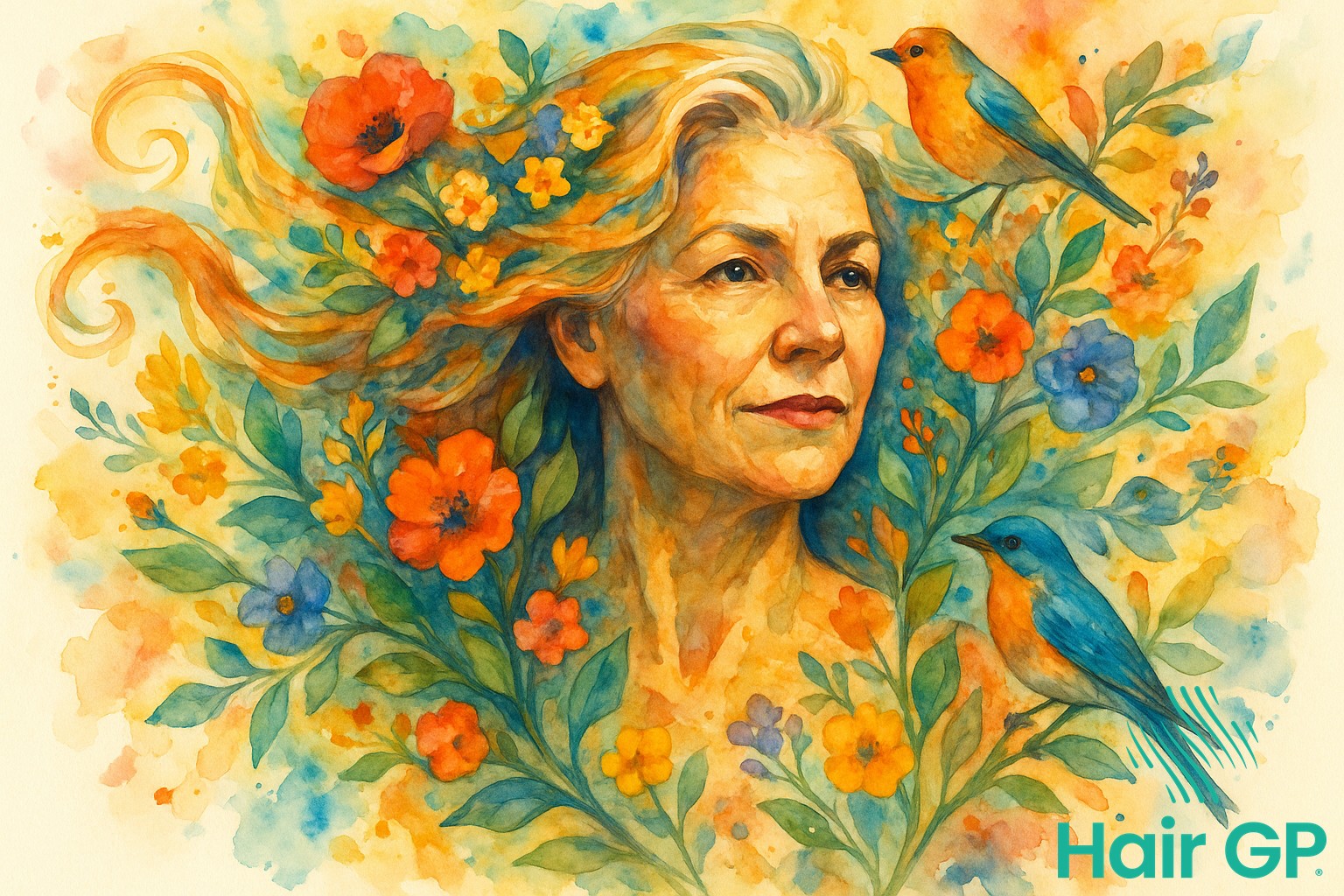
Conclusion
Navigating menopause hair loss represents a profound journey that extends far beyond physical changes. Whilst female hair loss during the menopausal transition can trigger a genuine confidence crisis, it’s crucial to remember that these experiences don’t define your worth or diminish your inherent beauty.
The path towards rebuilding self-esteem often reveals unexpected opportunities for growth and self-discovery. Many women report that confronting this challenge ultimately strengthened their self confidence, teaching them to value themselves beyond physical attributes. This transformation doesn’t happen overnight, but through patient self-compassion and consistent self-care.
Remember that you’re not alone in this experience. Millions of women worldwide face similar challenges, and sharing these stories creates powerful communities of support and understanding. The strategies discussed throughout this guide—from medical treatments to lifestyle adjustments—offer genuine hope for managing symptoms effectively.
As you continue this journey, be gentle with yourself. Celebrate small victories, whether it’s trying a new hairstyle, implementing a wellness routine, or simply feeling comfortable in your own skin. Your value extends infinitely beyond your appearance, and this menopausal transition, whilst challenging, can ultimately lead to a deeper, more authentic relationship with yourself.
Frequently Asked Questions
Hair loss affects up to 40% of women during menopause, with varying degrees of severity. It’s a normal part of hormonal changes and doesn’t reflect on your health or worth as a person.
Hair regrowth depends on the type of hair loss. Telogen effluvium often resolves, while androgenetic alopecia may require ongoing treatment. Many women see improvement with proper care and treatment.
The most effective approach combines medical treatments like minoxidil with lifestyle changes, proper nutrition, and stress management. Consult a healthcare provider for personalized recommendations.
Building a support network, practicing self-compassion, and focusing on overall wellness helps. Consider joining support groups or speaking with a counselor who understands menopause-related challenges.
Shorter, layered cuts often create more volume. Avoid heavy, one-length styles. Work with a stylist experienced in thinning hair to find flattering options that boost your confidence.
References
- Cash TF, Price VH, Savin RC. Psychological effects of androgenetic alopecia on women: comparisons with balding men and with female control subjects. J Am Acad Dermatol. 1993. PMID: 8408792
- Hunt N, McHale S. The psychological impact of alopecia. BMJ. 2005. PMID: 16239692
- Grymowicz M, Rudnicka E, Podfigurna A, Napierala P, Smolarczyk R, Smolarczyk K et al.. Hormonal Effects on Hair Follicles. Int J Mol Sci. 2020. PMID: 32731328
- Lucky AW, Piacquadio DJ, Ditre CM, et al. A randomized, placebo-controlled trial of 5% and 2% topical minoxidil solutions in the treatment of female pattern hair loss. J Am Acad Dermatol. 2004;50(4):541-553. PMID: 15034503
- Barrionuevo P, Nabhan M, Altayar O, Wang Z, Erwin PJ, Asi N et al.. Treatment Options for Hirsutism: A Systematic Review and Network Meta-Analysis. J Clin Endocrinol Metab. 2018. PMID: 29522176
- Gentile P, Garcovich S. Systematic Review of Platelet-Rich Plasma Use in Androgenetic Alopecia Compared with Minoxidil Int J Mol Sci. 2020. PMID: 32295047

